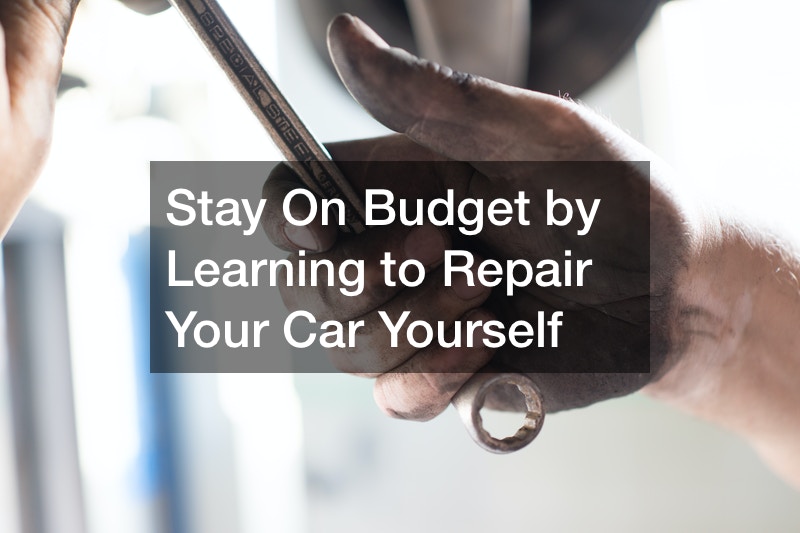
Stay On Budget by Learning to Repair Your Car Yourself

If you are tired of dealing with expensive car repair bills, the solution is to learn how to repair your car yourself. There are plenty of easy maintenance items and repairs for cars that anyone can do on their own.
While many repairs require a professional because of their complexity, there are just as many repairs you can do yourself. When you repair your car yourself, you can save a lot of money.
Why You Should Repair Your Car Yourself

Most vehicle owners decide to repair their cars themselves because of the savings. The savings aren’t the only benefit. Being able to repair your car yourself can mean being safer on the road.
Any driver should know how to change a tire, check their fluid levels, and make temporary repairs in a pinch. We all rely heavily on our cars to get us to work, for family obligations, and for our social lives. Knowing how to repair your car yourself can help keep your car out of the shop and on the road.
Here are some reasons that learning to take care of your car on your own is beneficial:
- You save time. Just because you need your repairs done right now does not mean that the mechanic can do them immediately. You may have to leave your car at the mechanic for a few days. When you make repairs on your own, it is on your schedule.
- Enjoy a sense of accomplishment. There is nothing better than knowing you have things under control. Being able to make your own repairs is really empowering.
- You never know, it may become your favorite hobby. That ad for Repairable Salvage Trucks For Sale may not seem so far-fetched after all. You may find that you really enjoy working on cars and decide to take on some additional projects.
There is a lot of reward in making your own car repairs and doing your own car maintenance. Of course, the savings is a big deal as well.
Car Maintenance
One of the best ways to keep car repair costs down is to make sure that your car gets the maintenance that it needs. Some of the staples when it comes to car maintenance include:
- Oil changes at manufacturer’s recommended intervals. Typically oil changes should be done every 3,000 to 5,000 miles depending on the manufacturer’s recommendations and what type of driving you do.
- Brake replacement. Your brake pads will need to be replaced every 25,000 miles for heavy driving use. In some cases, brakes can last far beyond that 25,000 miles.
- Coolant flush, tune-ups, transmission tune-ups, and more are all just a part of vehicle ownership.
Ensuring that you keep up with maintenance will help keep your car out of the shop and reduce the incidence of when you need to repair your car yourself. Learning how to perform basic maintenance tasks is an easy way to cut car care costs and extend your car’s life.
Other maintenance includes replacing windshield wipers when they are worn. Changing out your battery. Replacing air filters, gas line filters, fuses, modules, and headlights are all needs that you will likely come across during the life of your car ownership. Checking engine fluids, replacing low fluids, and replacing hoses are also common maintenance activities. All of these maintenance tasks can be done right in your own garage.
What You Need to Repair Your Car Yourself

You need some basic knowledge of your car to repair your car yourself or do the necessary maintenance. For example, you will need to know where your oil filter is located to do an oil change on your car.
Even the novice that has no knowledge of car maintenance or repair can easily learn to recognize the parts of a car and where they are located. There are some basic things you will need to have on hand whether you have plans to repair your car yourself or you want to do some maintenance:
- Proper hand tools. You will need, at minimum, a good set of socket wrenches. If you drive a foreign car, make sure they are a metric set. Other hand tools that will come in useful include a set of ramps, a mallet, screwdriver set, Allen Keys, and pliers.
- A safe workspace. If you are working in your garage, make sure there is enough room to work safely and keep the garage doors open whenever you have the car running.
- The right parts. You must always have the right parts and supplies on hand before starting any project.
You do not have to run out and buy an air compressor and power tools to have the right tools to repair your car yourself, but you will need some good hand tools for the job. A great way to ensure that you have the proper tools on hand is to research before you start the project.
For example, investing in an oil filter wrench to make it easier to remove the oil filter during oil changes is a great investment. You will use the wrench every time you change your oil. The right tools make it easier to repair your car yourself.
Another consideration is making sure you have all the parts you need to repair your car yourself or manage the regular maintenance. Nothing is worse than pulling everything apart to notice that you are missing a part, or worse yet, the parts you have do not fit.
There are no exceptions when it comes to having the proper parts and supplies. Layout everything that you are going to need before you start pulling things off the car. It will make the process go a lot smoother if you realize before you start the project that you forgot something.
Where You Get Your Parts From Matters
If you are new to car repair, you must get your parts from a trusted source that can also provide some guidance. Unfortunately, big-box discount stores typically do not hire people with the expertise that can help.
A local auto parts store is usually the best bet for getting the right parts and getting some guidance. You do not have to visit the dealership to buy the more expensive parts, but you do have to be sure that the aftermarket parts you choose are the right ones. A trusted auto parts store can help.
Step One in Learning How To Repair Your Car Yourself

Whether you have decided to take on all the maintenance on your own or repair your car yourself, be sure that you are using a trusted tutorial to get your information. It is not enough to pull up a video of a DIY’er that may or may not know what they are doing.
Go to a trusted site run by professional mechanics to learn more about repairing your car yourself. There are plenty of resources online that can take you through the step by step process of a wide range of repairs.
For example, if you are trying to perform an air conditioning service, look for help and tutorials from dealerships, automotive part websites, and even the manufacturer. You can find a wealth of information, including step by step videos, manuals, and support from parts manufacturers.
Review the tutorial or the manual to get a good understanding of what the process looks like, and the steps you need to take. Here are some tips to ensure that when you repair your car yourself or take on the maintenance the project will come together easier:
- Take pictures. Use your cell phone to take pictures before you take parts off and as you are doing the work. This will help you to have a visual reference of where everything goes.
- Label parts as you take them off. As you remove the parts, use color-coded sticky tabs. Place the same color tab on the old part and the new part. It will make it easier to keep track of your parts.
- Keep parts you remove separate from the new parts. It can be a very easy mistake to take a part off and then turn around and put the old part right back on. Keep separate piles of old parts and new parts, so you do not mix them up.
Besides taking pictures, marking parts, and keeping them all separate, consider numbering parts that go together. For example, numbering the gasket with the part that it goes to. These extra steps will make it easier to avoid some common mistakes.
The bottom line is you want to be sure that you have everything in place and understand what you need to do before you start pulling things apart. If you do not follow some basic rules of the process, you risk getting stuck with an expensive towing bill to get your car to the shop to figure out what went wrong. The first step when you repair your car yourself is to be prepared.
What Should You Not Repair On Your Own?

There are plenty of things to keep you busy when it comes to repairing your car yourself or doing the maintenance yourself. There are some things that you really should leave to the pros. For example, glass repair. Windshield replacement is an exacting science. Your windshield not only provides you with protection from the elements and road debris, but it also plays a vital function in your car’s structure. Leave that job to the pros.
Things like metal fabrication may require more investment in equipment than it is worth. Unless you are a welder by trade, it is best to forgo these types of repairs and let the professionals handle them for you.
There is a balance when it comes to deciding whether to repair your car yourself or taking it to the mechanic. Here are some tips for figuring out if you are up to the job or you better call in the big guns:
- Do you have the tools and equipment? Is it worth investing in the tools and equipment? If you need an engine hoist to get the job done, you will likely be much better off taking the car to the mechanic. If it is cost-prohibitive to invest in the right tools and equipment it is a good indication that you should get professional jobs done.
- Is there a risk you will void your warranty? If your warranty is at risk, don’t do the repairs yourself.
- How big is the problem? If the fan belt is not moving and you have tried everything you know to rectify the problem, it is time to get some help from a professional. The repair may be extensive, and if you tried everything you can do, it is time to cut your losses and get some help.
DIY car care is just like DIY home care. Just like in your home, there are some things you should not try on your own. If your roof leaks, you call the roofer because the job is too risky to manage alone. If your engine is locked up, you call the mechanic.
In some cases, you have the skillset but not the equipment which forces your hand. For example, you may have some masonry skills, but that does not mean you can install a new fireplace because you do not have the equipment. The same is true with your car. You may feel confident that you can pull the transmission and replace it, but it’s impossible without the right equipment.
You should repair your car yourself and take on the maintenance because it is an easy way to save money. Just know your limits. Learning how to repair your car yourself is a great achievement, but remember that everyone needs help sometimes.


